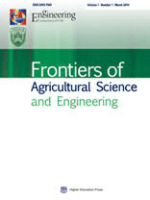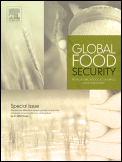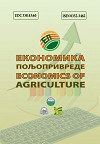
AGRICULTURAL HISTORY
Scope & Guideline
Charting the Evolution of Agriculture and Its Impact
Introduction
Aims and Scopes
- Interdisciplinary Historical Analysis:
The journal emphasizes interdisciplinary approaches, integrating history with environmental studies, sociology, and political economy to explore agricultural practices and their historical contexts. - Focus on Global and Local Contexts:
Publications often analyze agricultural history from both global and local perspectives, understanding how local practices relate to broader global trends and movements. - Critical Examination of Agricultural Policies:
The journal critically examines agricultural policies and practices, exploring their socio-political implications and the impact on communities, particularly marginalized groups. - Environmental History:
A consistent focus on environmental history, investigating how agricultural practices have shaped and been shaped by ecological factors over time. - Cultural and Social Dimensions of Agriculture:
The journal explores the cultural and social dimensions of agriculture, including food systems, community practices, and the role of gender and race in agricultural history.
Trending and Emerging
- Food Sovereignty and Justice:
There is an increasing focus on themes of food sovereignty and justice, examining how historical agricultural practices and policies affect contemporary food systems and social equity. - Environmental Justice and Sustainability:
Recent publications emphasize environmental justice and sustainability in agriculture, reflecting a growing concern with the ecological impacts of agricultural practices and the quest for sustainable solutions. - Intersections of Race, Gender, and Agriculture:
A notable trend is the exploration of the intersections of race, gender, and agriculture, highlighting the diverse experiences and contributions of various groups in agricultural history. - Globalization and Agricultural Systems:
Emerging studies increasingly analyze the impact of globalization on agricultural systems, exploring how global networks shape local practices and vice versa. - Incorporation of Indigenous Perspectives:
The journal is increasingly incorporating Indigenous perspectives and practices in agricultural history, recognizing their significance in contemporary discussions of land use and food systems.
Declining or Waning
- Traditional Agrarian Practices:
There has been a noticeable decline in papers focusing solely on traditional agrarian practices without a critical or contemporary lens, as the journal shifts towards more complex analyses of agricultural systems. - Single-Narrative Historical Accounts:
The journal appears to be moving away from single-narrative historical accounts, favoring multifaceted discussions that incorporate multiple perspectives and voices in agricultural history. - Narrowly Defined Regional Studies:
Research centered on narrowly defined regional studies is decreasing, as the journal increasingly prioritizes studies that connect local agricultural history to global trends and issues. - Static Agricultural Technologies:
There is a decline in works focused solely on static agricultural technologies, reflecting a broader interest in the dynamic interactions between technology, environment, and society. - Exclusively Economic Analyses:
Papers that focus solely on economic analyses of agriculture without considering social or environmental factors are becoming less prominent, as the journal embraces a more holistic approach.
Similar Journals

International Journal of Agricultural Sustainability
Cultivating Knowledge for a Sustainable FutureThe International Journal of Agricultural Sustainability, published by Taylor & Francis Ltd, is a leading platform for researchers and professionals in the field of agricultural science, economics, and sustainability. With an impact factor that reflects its strong academic credibility and contribution to the field, the journal has earned esteemed rankings, including Q1 in Agronomy and Crop Science and Q2 in Economics and Econometrics for 2023. Engaging an audience keen on advancing sustainable agricultural practices, the journal has embraced Open Access since 2023, facilitating broader dissemination of vital research findings. With Scopus ranks placing it in the top quartiles and percentiles within its categories, the International Journal of Agricultural Sustainability aims to foster interdisciplinary dialogue and innovative approaches to agricultural sustainability, making it an essential resource for students, researchers, and industry professionals alike.

NJAS-Impact in Agricultural and Life Sciences
Innovating solutions for sustainable agriculture and environmental health.NJAS-Impact in Agricultural and Life Sciences is a pivotal open-access journal, published by Taylor & Francis Ltd, focusing on the interdisciplinary nexus between agricultural practices and life sciences. Anchored in the United Kingdom, this journal aims to provide a comprehensive platform for the dissemination of innovative research that addresses critical challenges in environmental sustainability, agricultural productivity, and biological advancements. With its inaugural issue dated from 2023 to 2024, NJAS prominently features the latest empirical studies, reviews, and theoretical contributions that enrich existing knowledge and provoke thought among researchers and practitioners alike. Although currently ranking within the lower percentiles across various Scopus categories, the journal aspires to establish itself as a significant contributor to the dialogue on agricultural and environmental sciences. As scholars in these fields seek to bridge the gaps in understanding, NJAS invites submission from diverse perspectives, underscoring the importance of collaborative knowledge-building in addressing the complexities of our changing global landscape.

AGRICULTURAL HISTORY REVIEW
Charting the Historical Landscape of AgricultureAGRICULTURAL HISTORY REVIEW, published by the BRITISH AGRICULTURAL HISTORY SOC, serves as a vital resource for scholars and professionals exploring the intersections of agriculture, society, and history. With a publication history spanning from 1978 to 2023, the journal delves into diverse topics within the fields of agronomy, animal science, and the history of science, all while maintaining a commitment to rigor and scholarly excellence, as reflected in its prestigious rankings. Although it falls within Q4 in Agronomy, Animal Science, and Economics, it holds a commendable Q3 status in History and Philosophy of Science, indicating a significant contribution to the understanding of agricultural practices through historical lenses. The journal is based in the United Kingdom and is accessible for those interested in gaining insights into the historical aspects of agricultural development. While the journal does not provide open access options, it remains a critical reference for researchers seeking to enhance their understanding of agriculture's past and its implications for future practices.

Studies in Agricultural Economics
Fostering Collaboration for a Sustainable FutureStudies in Agricultural Economics is a premier journal published by AGRARGAZDASAGI KUTATO & INFORMATIKAI INTEZET in Hungary, focusing on innovative research in the interdisciplinary fields of agricultural, biological, and economic sciences. Since becoming an Open Access journal in 1997, it has aimed to enhance the visibility of agricultural economics scholarship while promoting global engagement among researchers, practitioners, and policymakers. With its robust Q2 and Q3 rankings across varied categories including Development and Geography, this journal serves as a significant platform for disseminating cutting-edge studies that address crucial issues in agriculture and rural development. The journal's continuous publication since 2011 until 2024 exemplifies its commitment to providing timely insights into evolving agricultural challenges. With a strong Scopus ranking across multiple domains, particularly in the social sciences and agricultural sectors, it stands as a vital resource for anyone looking to advance knowledge and practice in these critical areas.

Frontiers of Agricultural Science and Engineering
Championing open-access knowledge in agricultural science.Frontiers of Agricultural Science and Engineering, published by HIGHER EDUCATION PRESS, is a distinguished open-access journal established in 2014, dedicated to advancing research across the fields of agricultural and biological sciences, biotechnology, and veterinary studies. With an impressive Q1 ranking in both Agricultural and Biological Sciences and Veterinary categories for 2023, this journal positions itself prominently within the academic landscape, reflecting the importance and quality of the research it disseminates. The journal serves as a vital platform for researchers, professionals, and students worldwide, featuring a broad array of studies that enhance our understanding of agricultural technologies, biotechnological innovations, and veterinary sciences. With a focus on rigor and accessibility, Frontiers of Agricultural Science and Engineering promotes the global exchange of knowledge, encouraging the collaboration that is essential for tackling contemporary challenges in these critical fields. Available online with a comprehensive range of article options, it continues to contribute to the scientific community's advancements in agricultural and biological disciplines.

JOURNAL OF AGRICULTURAL AND RESOURCE ECONOMICS
Cultivating insights that shape the future of agriculture.Journal of Agricultural and Resource Economics is a pivotal platform in the realm of agricultural and resource economics, published by the Western Agricultural Economics Association. Since its inception, the journal has embraced an Open Access model, fostering widespread dissemination of research findings to benefit both scholars and practitioners in the field. The journal operates within an impressive global ranking framework, resting in Q2 across several pertinent categories including Agronomy and Crop Science, Animal Science and Zoology, and Economics and Econometrics. With its ISSN 1068-5502 and E-ISSN 2327-8285, it has garnered attention for its rigorous academic standards and impactful contributions to the discourse on resource management and agricultural practices. Researchers, professionals, and students alike will find the journal's ongoing commitment to advancing knowledge invaluable, with publications that span from 1996 to 2024 capturing evolving trends and insights in the sector.

Global Food Security-Agriculture Policy Economics and Environment
Fostering interdisciplinary dialogue for a sustainable food future.Global Food Security - Agriculture Policy Economics and Environment is a leading interdisciplinary journal published by Elsevier that addresses critical issues in food security through the lens of agriculture, economics, and environmental sustainability. With an impressive impact factor and a distinguished placement in the Q1 quartile across multiple categories including Ecology, Food Science, and Safety Research for 2023, this journal is a vital resource for researchers and practitioners aiming to address modern challenges in global food systems. Covering essential topics from agricultural policy to ecological implications, the journal provides a platform for innovative research and policy discussions that foster the advancement of food security on a global scale. Notably, it is indexed in Scopus, where it ranks in the top percentiles across its relevant categories, reflecting its significance in the field. The journal is accessible to a wide audience, making it an indispensable source of knowledge for professionals and students aiming to tackle the complex interplay between food production and environmental stewardship.

Journal of Tekirdag Agriculture Faculty-Tekirdag Ziraat Fakultesi Dergisi
Exploring the intersection of agriculture and sustainability.The Journal of Tekirdag Agriculture Faculty-Tekirdag Ziraat Fakultesi Dergisi, published by UNIV NAMIK KEMAL, represents a significant platform dedicated to the dissemination of research in the fields of agricultural and biological sciences. With an ISSN of 1302-7050 and E-ISSN 2146-5894, this journal aims to advance knowledge and innovation within its scope, which encompasses a diverse array of agricultural topics and environmental pollution. Notably, it has achieved a Q3 category ranking in Agricultural and Biological Sciences and a Q4 category ranking in Pollution for 2023, reflecting its growing influence in the academic community. Operating from Turkey, the journal publishes articles that seek to address contemporary challenges in agriculture and environmental science, thus fostering collaborations among researchers, professionals, and students worldwide. Researchers can benefit from the journal’s focus on applied sciences, providing insights and solutions pertinent to real-world issues. Engage with cutting-edge studies and contribute to this evolving field by exploring the transformative research featured within.

Ekonomika Poljoprivreda-Economics of Agriculture
Connecting Scholars and Practitioners in Agrarian StudiesEkonomika Poljoprivreda-Economics of Agriculture is a pivotal journal in the field of agricultural economics, dedicated to advancing knowledge and research in this critical area of study. Published by the Balkan Scientific Association of Agrarian Economists, this esteemed journal plays a vital role in disseminating Open Access research since 2014, ensuring that findings are accessible to a global audience. With its ISSN 0352-3462, the journal focuses on a diverse range of topics within agricultural economics, aiming to bridge theoretical frameworks with practical applications that address contemporary challenges in the sector. The journal's commitment to fostering scholarly communication makes it an essential resource for researchers, professionals, and students interested in the evolution of agricultural practices and policies. Readers can expect high-quality, peer-reviewed articles that not only contribute to academic discourse but also inform real-world agricultural strategies.

Scientific Papers-Series Management Economic Engineering in Agriculture and Rural Development
Elevating Agricultural Practices with Cutting-edge ResearchScientific Papers-Series Management Economic Engineering in Agriculture and Rural Development is a premier open access journal dedicated to advancing the field of agricultural and rural development management. Published by the University of Agronomic Sciences and Veterinary Medicine Bucharest, this journal has been a valuable resource for researchers, practitioners, and students since its inception in 2009. With a focus on the integration of economic engineering principles into agricultural practices, the journal aims to provide innovative solutions and insights that address contemporary challenges in rural development. While the journal's H-index and specific Scopus rankings are not listed, its open access format ensures that cutting-edge research is readily available to a global audience, facilitating engagement and collaboration across disciplines. Located in the heart of Romania, the journal serves as a critical platform for disseminating impactful research and fostering dialogue in the ever-evolving landscape of agriculture and rural development.